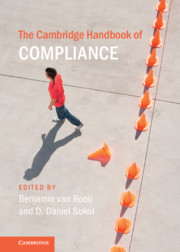Book contents
- The Cambridge Handbook of Compliance
- The Cambridge Handbook of Compliance
- Copyright page
- Contents
- Figures
- Tables
- Contributors
- 1 Introduction: Compliance as the Interaction between Rules and Behavior
- Part I Compliance Concepts and Approaches
- Part II Deterrence and Incapacitation
- Part III Incentives
- 22 Does Tort Deter? Inconclusive Empirical Evidence about the Effect of Liability in Preventing Harmful Behaviour
- 23 Crowding-Out Effects of Laws, Policies and Incentives on Compliant Behaviour
- 24 Financial Incentives for Whistleblowers: A Short Survey
- 25 Designing Corporate Leniency Programs
- 26 Incentive Contracts
- Part IV Legitimacy and Social Norms
- Part V Capacity and Opportunity
- Part VI Compliance and Cognition
- Part VII Management and Organizational Processes
- Part VIII Measuring and Evaluating Compliance
- Part IX Analysis of Particular Fields
- References
26 - Incentive Contracts
from Part III - Incentives
Published online by Cambridge University Press: 07 May 2021
- The Cambridge Handbook of Compliance
- The Cambridge Handbook of Compliance
- Copyright page
- Contents
- Figures
- Tables
- Contributors
- 1 Introduction: Compliance as the Interaction between Rules and Behavior
- Part I Compliance Concepts and Approaches
- Part II Deterrence and Incapacitation
- Part III Incentives
- 22 Does Tort Deter? Inconclusive Empirical Evidence about the Effect of Liability in Preventing Harmful Behaviour
- 23 Crowding-Out Effects of Laws, Policies and Incentives on Compliant Behaviour
- 24 Financial Incentives for Whistleblowers: A Short Survey
- 25 Designing Corporate Leniency Programs
- 26 Incentive Contracts
- Part IV Legitimacy and Social Norms
- Part V Capacity and Opportunity
- Part VI Compliance and Cognition
- Part VII Management and Organizational Processes
- Part VIII Measuring and Evaluating Compliance
- Part IX Analysis of Particular Fields
- References
Summary
Abstract: This chapter explores the importance of verifiability to contractual provision of incentives for contract performance or compliance. The crucial role of evidence and evidence-disclosure decisions is highlighted. Parties to a contract dispute convey information to the court by disclosing evidence. Actions taken by the parties in the productive phase (or primary activity) of their relationship influence the evidence that is available should a dispute arise. These considerations are important for practitioners in that 1) the lack of evidence to prove one’s claim may lead to some productive relationships being avoided or undertaken at a less than optimal level, and 2) the primary activity of the parties may involve steps to ensure relevant evidence should a breach occur. Many practical examples are discussed.
- Type
- Chapter
- Information
- The Cambridge Handbook of Compliance , pp. 373 - 382Publisher: Cambridge University PressPrint publication year: 2021

